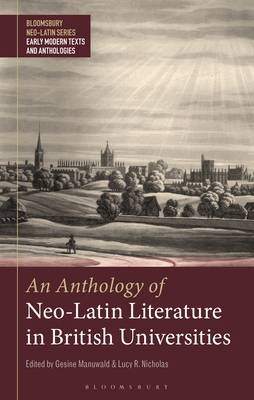
- Afhalen na 1 uur in een winkel met voorraad
- Gratis thuislevering in België vanaf € 30
- Ruim aanbod met 7 miljoen producten
- Afhalen na 1 uur in een winkel met voorraad
- Gratis thuislevering in België vanaf € 30
- Ruim aanbod met 7 miljoen producten
An Anthology of Neo-Latin Literature in British Universities
Omschrijving
Compiled by a team of experts in the field, this volume brings to view an array of Latin texts produced in British universities from c.1500 to 1700. It includes a comprehensive introduction to the production of Neo-Latin and Neo-Greek in the early modern university, the precise circumstances and broader environments that gave rise to it, plus an associated bibliography. 12 high-quality sections, each prefaced by its own short introduction, set forth the Latin (and occasionally Greek) texts and accompanying English translations and notes. Each section provides focused orientation and is arranged in such a way as to ensure the volume's accessibility to scholars and students at all levels of familiarity with Neo-Latin. Passages are taken from documents that were composed in seats of learning across the British Isles, in Oxford, Cambridge, Dublin, Edinburgh and St Andrews, and adduce a wide range of material from orations and disputational theses to collections of occasional verse, correspondence, notebooks and university drama.
This anthology as a whole conveys a sense of the extent of Latin's role in the academy and the span of remits in which it was deployed. Far from simply offering a snapshot of discrete projects, the contributions collectively offer insights into the broader culture of the early modern university over an extended period. They engage with the administrative operations of institutions, pedagogical processes and academic approaches, but also high-level disputes and the universities' relationship with the worlds of politics, new science and intellectual developments elsewhere in Europe.Specificaties
Betrokkenen
- Uitgeverij:
Inhoud
- Aantal bladzijden:
- 320
- Taal:
- Engels
- Reeks:
Eigenschappen
- Productcode (EAN):
- 9781350160262
- Verschijningsdatum:
- 14/07/2022
- Uitvoering:
- Hardcover
- Formaat:
- Genaaid
- Afmetingen:
- 140 mm x 216 mm
- Gewicht:
- 508 g

Alleen bij Standaard Boekhandel
Beoordelingen
We publiceren alleen reviews die voldoen aan de voorwaarden voor reviews. Bekijk onze voorwaarden voor reviews.






